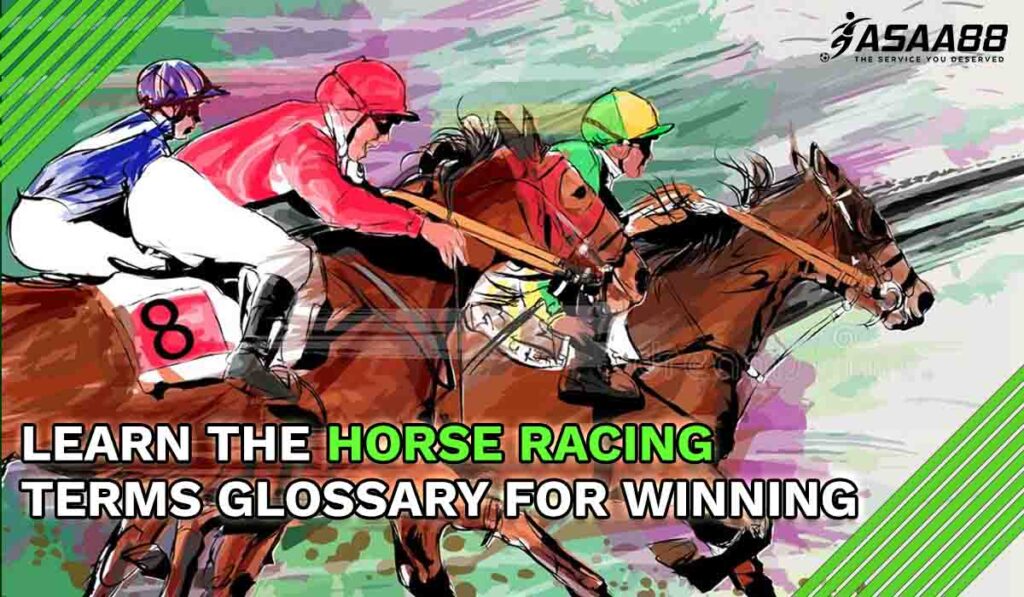Horse racing betting can be fun, but understanding the sport’s terminology can be overwhelming for newcomers. So, today, let us talk about horse racing terms.
Betting on horse racing is hundreds of years old, with loads of terms, words, and phrases used casually within the sport that newbies may not be aware of.
That’s why we’ve put together this useful Horse Racing Terms Glossary for rookie bettors.
Here’s a glossary of horse racing terms to help you understand some unusual words adopted in horse racing. Horse racing dates back hundreds of years; over the journey, it has created a language all of its own.
Table Of Contents
- 1 Horse racing terms in Online Malaysia & Singapore Casino
- 2 Horse slang terms- horse racing terms for bettors in Malaysia & Singapore
- 3 Horse riding terms for Online Singapore & Malaysia punters
- 4 Horse vocabulary or horse lingo for Online Malaysia & Singapore Casino
- 5 What is a furlong in horse racing?
- 6 Horse gambling terms or Equestrian terms in Online Malaysia & Singapore Casino
- 7 Horse racing terminology – Horse racing terms you must know
- 8 Few more racing words and horse racing terms in Online Singapore & Malaysia Betting
- 9 Conclusion
- 10 FAQ
Horse racing terms in Online Malaysia & Singapore Casino
Allowance or Allowance Race: A non-claiming event where the racing secretary allots weight allowances depending on the previous purse earnings or/and types of victories.
Also “AE” or Eligible: Horses entering the field who will not run unless other horses are scratched.
Apprentice Jockey: A student jockey who will receive a weight allowance of multiple degrees based on his or her experience.
Backstretch: It’s the straight portion of the track opposite the stable area or the finish line.
Baby Race: It’s a race for two-year-old horses, particularly early in the season.
Blinkers: Eye equipment that limits a horse’s vision; usually used to help the horse focus on running and thus eliminates distraction.
Horse slang terms- horse racing terms for bettors in Malaysia & Singapore
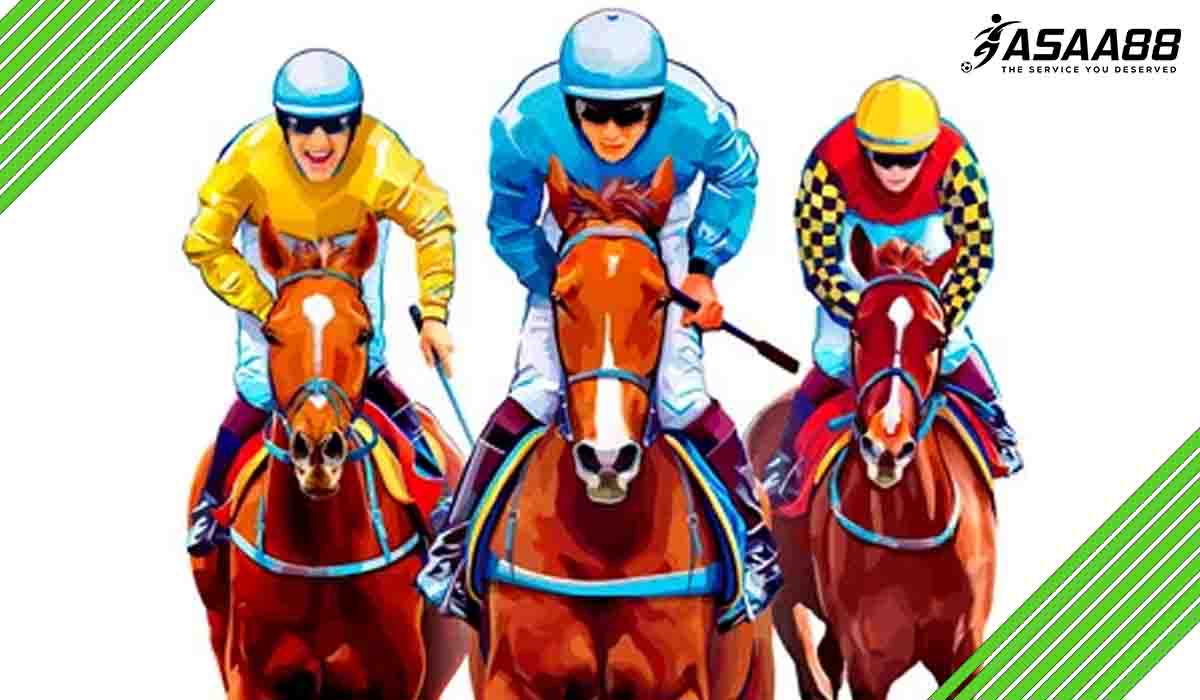
Break Maiden: When a rider or horse wins for the very first time.
Breeze: A term used to describe a workout where a horse is running under a hold without praise from the rider.
Bridge jumper: A bettor that puts a large bet in the Show or Place pools on odds-on favorites.
Read a complete blog on Horse Racing Betting Tips.
Horse riding terms for Online Singapore & Malaysia punters
Broodmare: It’s a female thoroughbred significant for breeding.
Dam- Broodmare dam: A mare producing female progeny meant for breeding.
Sire- Broodmare sire: A male horse producing female progeny used for breeding.
Bug Boy: An apprentice jockey
Bull Ring: A small track with an oval less than one mile and very tight turns.
Buy the race: This means using each horse running in a definite race in an exotic wager. For instance, if a player gets a Daily Double ticket for the 1st and 2nd race with 8 for ALL, the bettor will have “bought” the second race as well.
Claiming Race: A race where every horse in the field has a price and could be bought by any individual that makes a valid claim before the running of the race.
Clocker: A person that rates and/or times workouts.
Clubhouse Turn: The first turn of races that commence on the homestretch/ frontstretch.
Colt: A male horse.
Condition: To train a horse
Conditions: The situations under which a race will be run, such as a purse, surface, distance between horses, and eligibilities.
Consolation: A payout, classically in a Pick Six, where players receive money without a full winning ticket. For instance, a player hitting 5-of-6 races in the Pick 6 will usually collect a small consolation payout. Consolations are usually much smaller than the full payout.
Horse vocabulary or horse lingo for Online Malaysia & Singapore Casino
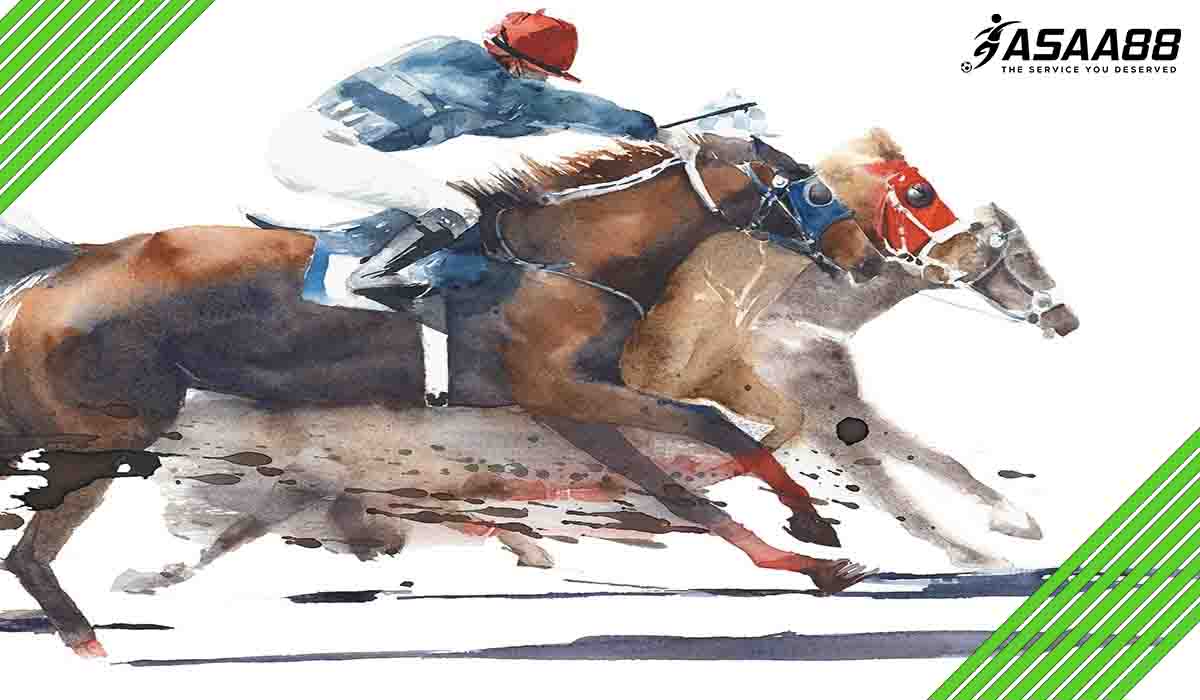
Daily Double: A wager where the player attempts to pick the winner of two consecutive races with a single ticket.
Dam: The mother of a horse.
Dark: A day when the track doesn’t feature live racing.
Derby: A stakes race for just three-year-old horses.
Distance of ground: A race run or route race around two turns.
Dog: A cone or other obstruction kept a specified distance from the turf course’s rail to keep horses in a race from damaging that percentage of the grass.
Eased: A horse that is stopped or pulled up before finishing the race
Exacta: A bet where the player attempts to reach the 1st and 2nd place horse on one ticket.
Fast Track: Ranking of a dry and hard dirt track.
Filly: A female horse
Fire Sale: A drastic drop in the horse’s claiming price.
Foal: A newborn horse.
Form: The recent condition of a horse; which can also refer to The Daily Racing Form publication.
Fractions: Clocking at quarter-mile additions in either a workout or a race.
Front Runner: A horse that is supposed to run on or near the lead.
What is a furlong in horse racing?
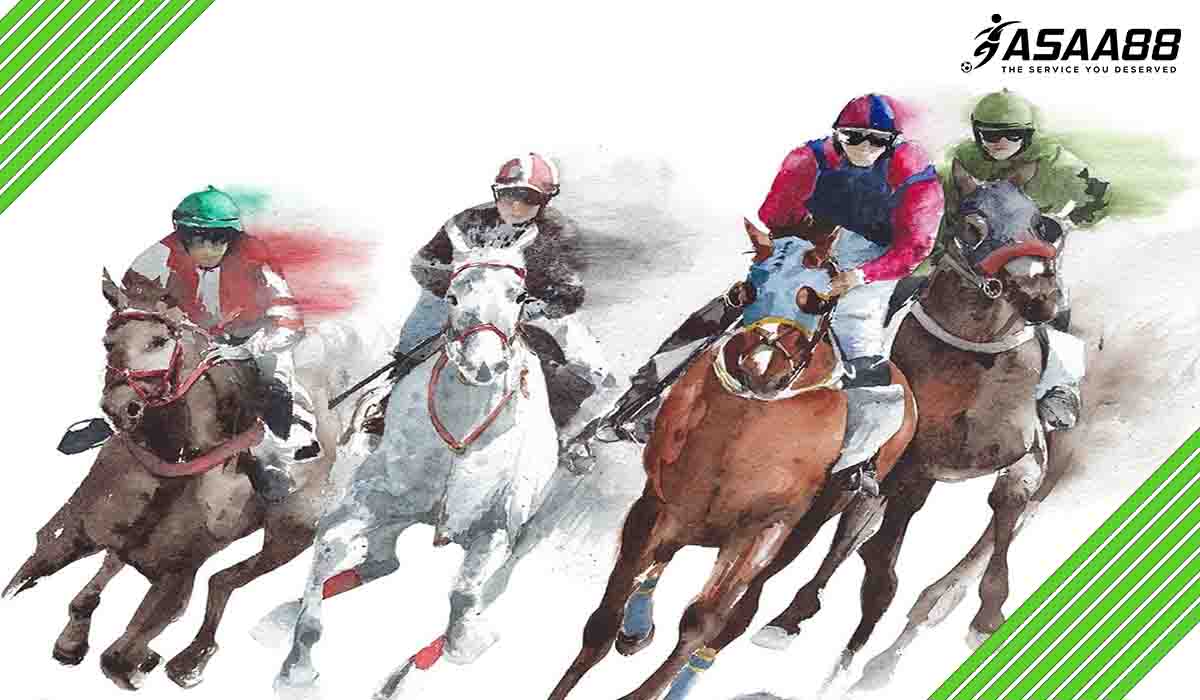
Furlong: One-eighth of a mile.
Gelding: A sterilized male horse.
Going: The state of the racing surface. Dirt courses are ranked as Fast, Good, Sloppy, or Muddy. Turf courses rates as Firm, Heavy, Good, Yielding, or Soft.
Graded Race: A stakes race which is assigned a grade among I, II, or III by the American Graded Stakes Committee depending on the relative strength of the race relative to all other races. This is the uppermost form of racing.
Half-sister: A female horse from the same dam as the other horse but with a different sire. Horses with similar sire but different dams are not be half-sisters or brothers.
Handicap: A race where the racing secretary assigns weights to match the winning chances of the entrants; or to study horse’ records to determine the chances of each horse to win the race. Read a blog on Handicap Betting.
Handily: A fairly energetic workout where the jockey urges the horse on without using the whip.
Handle: Total amount of bet on a race or during the entire day.
Hand ride: A jockey urging a horse on by “scrubbing” his hand down its neck. A horse under a hand-only ride was not whipped by the jockey.
Heavy Track: A grass racing surface that has an extremely large amount of water and is in bog-like condition.
Horse: Technically, a five years old or greater male horse is a “horse”. Under-five years of age, the male horse is technically a “colt”.
Horse gambling terms or Equestrian terms in Online Malaysia & Singapore Casino
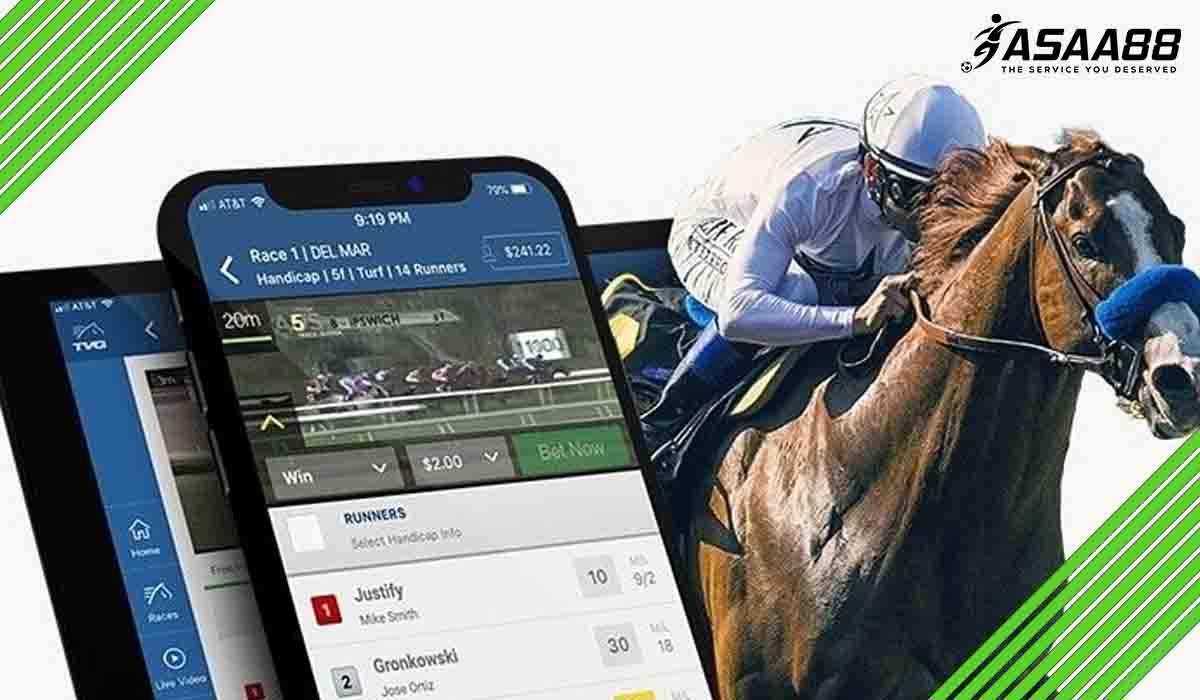
In hand: A horse running in restraint.
Inquiry: An official investigation by the bailiffs of the race to determine if a foul was committed by a jockey or horse.
In the money: To come in the top four; usually entitles the owner to a share of the prize. In online Malaysian betting terms “in the money” means finishing in the top three.
Irons: Stirrups
Jockey agent: An individual that gets rides for a jockey.
Juvenile: A two-year-old horse.
Look of Eagles: A horse with a confident look.
Lug In: A horse bearing (drifts towards the rail) during the stretch run; the sign of a tired horse.
Maiden: A horse who never won a race; or a race for horses who never won a race.
Marathon: A race longer than 1 ¼ mile long.
Mare: A five years old or greater female horse.
Middle distance: A race shorter than 1 1/8 miles or longer than seven furlongs.
Minus Pool: When plenty of money is bet on one horse that the pool becomes insufficient, pay the legal minimum odds to the winning ticket holders. In this situation, the track is essential to make up the difference to make sure that the bettors are paid the full amount.
Morning line odds: The odds are set by the track before opening the pools.
Muddy Track: A soft, wet, and holding dirt track.
Oaks: A stakes race for all three-year-old fillies.
Objections: A foul by a jockey monitoring the race.
Odds Board: The tote board, is typically found in the infield.
Off the board: A horse failing to finish in the money.
Off the pace: A horse lagging back in the early stages of the race.
Horse racing terminology – Horse racing terms you must know
Off-track: A racing surface other than Firm (Turf/Grass) or Fast (Dirt).
Optional Claimer: A race in which the horses in the field may or may not enter for a claiming price.
Overlay: A horse whose odds are greater than its real chance of winning, as identified by the player. For instance, if a player sees that horse A’s odds are 4/1 that he might win, but the present odds at the track offer at 10/1, that horse would be thought of as an “overlay”. Based on that, underlays are considered bad, while overlays are good.
Pace: The speed of the leaders at every stage of the race.
Parimutuels: French system of wagering- winning bettors get the money from the losers, after a deduction of a fraction by the track.
Pick 3 (or 4, 5, 6, etc.): An exotic wager needing the player to pick the winner in consecutive races.
Post: Starting gate.
Quarter crack: An injury to the horse’s hoof.
Quarter pole: Post on the infield rail showing two furlongs to the finish line.
Rank: A horse refusing to get rates early in the race.
Rate: To restrain a horse initially in the race to conserve energy for the later stages.
Route: Commonly, a race that runs around two turns.
School: To train a horse, in the starting gate or the paddock.
Scratch: To remove a horse from a race.
Few more racing words and horse racing terms in Online Singapore & Malaysia Betting
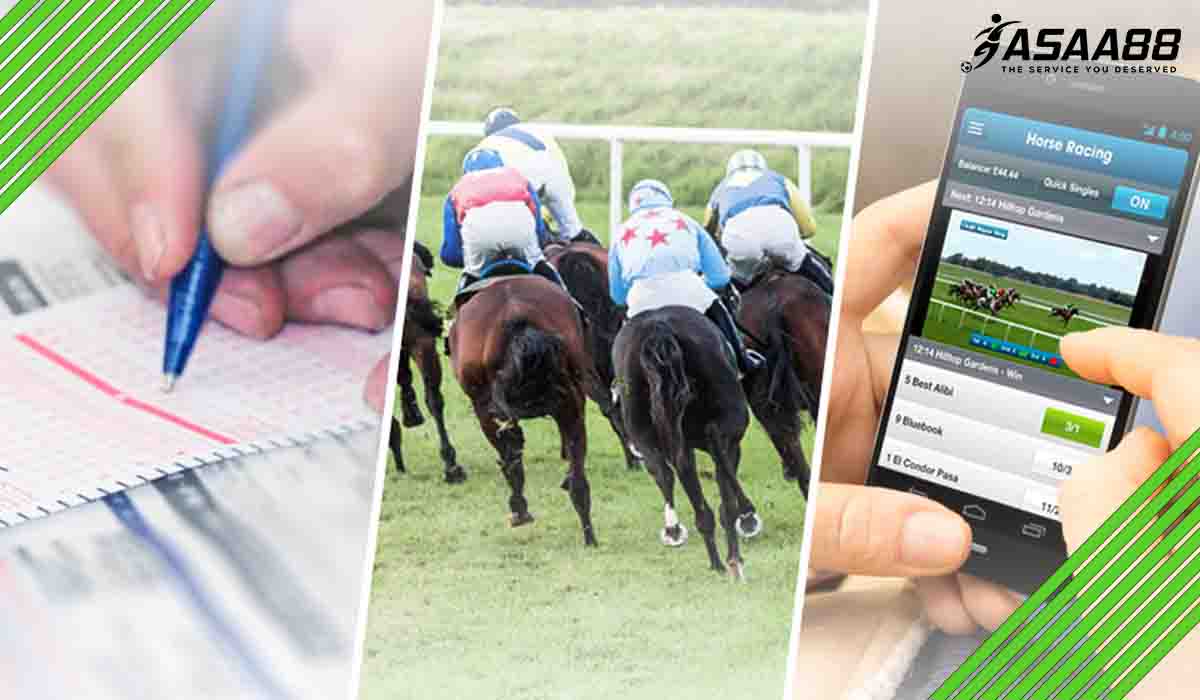
Shadow roll: A roll of cloth wrapped across a horse’s nose to block its vision of the ground or prevent it from jumping shadows.
Shake up: Urging by the jockey, with his hands or either the whip, to make the horse run fast.
Shipper: A horse traveling from one track to another to run in the race.
Shut out: When a player cannot make the bet at the window before the gate opening.
Sloppy track: A wet track, covered with puddles, but not “muddy” yet.
Spit the bit: When a tired horse stops running.
Sprint: A short race, seven or fewer furlongs.
Stewards: Three-person panel that identifies whether or not any rules violations happened during the race.
Superfecta: A wager where the player attempts to select the sequence of the first four finishers in a race. As this wager is difficult, a winning superfecta wager pays out at high odds.
Tag: Claiming price. A horse entering a “tag” is entering in a claiming race.
Track Take: Money subtracted from each pool to track taxes and revenue.
Trifecta: A wager where the player selects the first three horses sequence in a race.
Turf course: A grass-covered course.
Under wraps: A horse whose rider is holding it back and keeping it from running at top speed.
Washed out: A nervous and a sweating horse.
Conclusion
This covers most of the horse racing terms. If you’d like to learn more about the same, check out ASAA88 – Online Singapore & Malaysia Casino blogs on betting
FAQ
Often horse races are won just by the tip of a nose or a body length or two. Factors such as the jockey’s ability, nutrition, the track surface, and training all play a role in the outcome. But the mindset of a horse is the most important of all.
When it comes down to it, what’s going on in that horse’s head often makes him a good runner. When we make a horse run on the treadmill in the lab, he’ll often paw at the tread, like he’s saying, ‘hey, I want to go and have some fun. It tells that he loves running. So much of what makes a horse a good racer is up in the head.
Picking a winner by reading the form numbers 1-9 specify the position the horse finished in the race.
1. “0” indicates that the horse reached outside the first 9
2. The symbol “–” distinguishes racing seasons.
3. Numbers before the “– “ are for end season
4. The symbol “/” indicates a longer gap; for instance, if the horse missed a whole racing season
5. “P” or “PU” shows that the jockey stops the horse and can not complete the race
The following abbreviations typically apply to jump racing:
1. “F” shows the horse fell
2. “R” shows the horse refused
3. “BD” shows another runner pulled the horse down
4. “U” or “UR” shows that the horse unseated its jockey
You may also see these abbreviations:
1. “C” shows a horse has won on the same course before
2. “D” shows a horse has won over that particular distance before
3. “CD” shows a horse has won over the same course and distance
4. “BF” stands for beaten favorite and specifies a horse was favorite for a race but did not win
The term ‘ridden along’ means your horse is being ridden on a loose harness to let it gallop freely. It means that the horse is producing maximum output.
Dead-heat refers to a situation when two or more favorites in the race end up tying. This is a rare occurrence- because there is no winner despite judges closely looking at all parameters. There has to be literally no difference between the ties for a dead heat to happen.
For bettors, a dead heat means it is time to split the winnings. All winners equally divide the payout between them. For jockeys too, this means divided earnings. They cannot take the full amount home.
Ran out means that instead of jumping over the hurdle- the horse has taken a detour. It may run around the hurdle, or the jockey may take it off-track. It literally means that the horse has “run out” of the competition, and is disqualified from the race.
People betting on disqualified horses lose their stakes. It is a rare phenomenon, because most jockeys stay the course to collect their fees.
A length is a period of elapsed time on the horse racing track. But actually, the term indicates the difference between the winning horses. It determines by how far one horse is from another- and the commentators usually declared by how many lengths the winner has beaten the runner up. It is usually the length of a horse- which measures 8-9 ft from the tip of its nose to its tail.
The first length is always the length of the winning horse. So, when the result is that the winner beat the runner up “by two lengths”, it means that another horse would fit in in the distance that remained between the tip of the tail of the winner and the nose of the runner up.
Post time stands for the time of starting of the horse race. Past that point, no new bets are admitted. The idea is that at that time, all the horses, jockeys and runners should be at their “posts”.
In other words, it is the “ready” mark of the race when everyone takes their places and the books close to keep the bets secure. “Post time” is one of the most popular horse racing words.
“Gelding” refers to castrated equines like horses, donkeys or mules. When it comes to horses, castration makes the horse more manageable. Since hormonally driven stallions are more difficult to control, they may be castrated to induce behavioral change. To “geld” means to neuter or curb something. A horse that undergoes the process, hence, is called a gelding.
In horse racing, some horses can be gelded if they are easily distracted by nearby animals, or is difficult to control. However, gelding makes winning horses ineligible for breeding- thereby often bringing down their market value. In that case, the value of the stallion that sired the gelding goes up.

